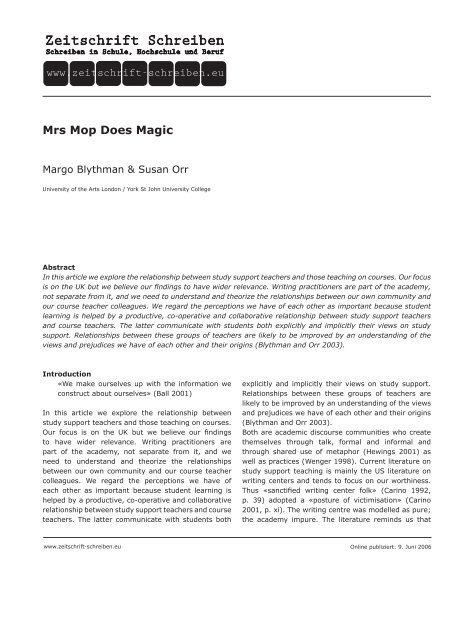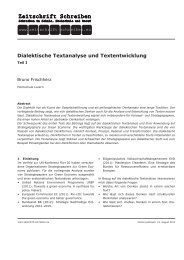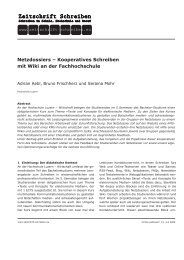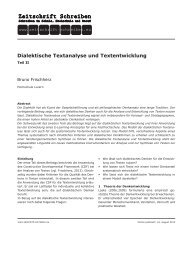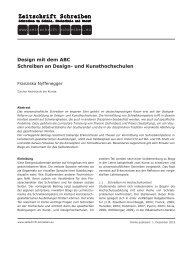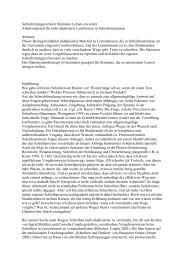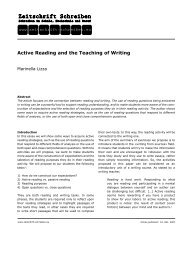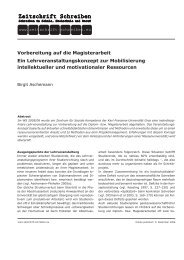Mrs Mop Does Magic - Zeitschrift Schreiben
Mrs Mop Does Magic - Zeitschrift Schreiben
Mrs Mop Does Magic - Zeitschrift Schreiben
Create successful ePaper yourself
Turn your PDF publications into a flip-book with our unique Google optimized e-Paper software.
<strong>Mrs</strong> <strong>Mop</strong> <strong>Does</strong> <strong>Magic</strong><br />
Margo Blythman & Susan Orr<br />
University of the Arts London / York St John University College<br />
Abstract<br />
In this article we explore the relationship between study support teachers and those teaching on courses. Our focus<br />
is on the UK but we believe our findings to have wider relevance. Writing practitioners are part of the academy,<br />
not separate from it, and we need to understand and theorize the relationships between our own community and<br />
our course teacher colleagues. We regard the perceptions we have of each other as important because student<br />
learning is helped by a productive, co-operative and collaborative relationship between study support teachers<br />
and course teachers. The latter communicate with students both explicitly and implicitly their views on study<br />
support. Relationships between these groups of teachers are likely to be improved by an understanding of the<br />
views and prejudices we have of each other and their origins (Blythman and Orr 2003).<br />
Introduction<br />
«We make ourselves up with the information we<br />
construct about ourselves» (Ball 2001)<br />
In this article we explore the relationship between<br />
study support teachers and those teaching on courses.<br />
Our focus is on the UK but we believe our findings<br />
to have wider relevance. Writing practitioners are<br />
part of the academy, not separate from it, and we<br />
need to understand and theorize the relationships<br />
between our own community and our course teacher<br />
colleagues. We regard the perceptions we have of<br />
each other as important because student learning is<br />
helped by a productive, co-operative and collaborative<br />
relationship between study support teachers and course<br />
teachers. The latter communicate with students both<br />
explicitly and implicitly their views on study support.<br />
Relationships between these groups of teachers are<br />
likely to be improved by an understanding of the views<br />
and prejudices we have of each other and their origins<br />
(Blythman and Orr 2003).<br />
Both are academic discourse communities who create<br />
themselves through talk, formal and informal and<br />
through shared use of metaphor (Hewings 2001) as<br />
well as practices (Wenger 1998). Current literature on<br />
study support teaching is mainly the US literature on<br />
writing centers and tends to focus on our worthiness.<br />
Thus «sanctified writing center folk» (Carino 1992,<br />
p. 39) adopted a «posture of victimisation» (Carino<br />
2001, p. xi). The writing centre was modelled as pure;<br />
the academy impure. The literature reminds us that<br />
www.zeitschrift-schreiben.eu Online publiziert: 9. Juni 2006
students come to the writing centre with stories about<br />
how «they’re traumatised by their departments. It’s<br />
like they’ve been beaten up by their department»<br />
(Leverenz 2001, p. 57).<br />
We argue that, with a mature conceptualisation of<br />
ourselves as professionals and a need to move away from<br />
binaries, it is time to explore the other side rather than<br />
see the relationship as one of «goodies and baddies.»<br />
We need to recognise a dialectical relationship where<br />
we construct them and they construct us through an<br />
iterative process.<br />
«It’s easy for them….»<br />
In this section we offer a series of illustrative stereotypes<br />
that are representative of the ways that we view course<br />
teachers and the ways we perceive that they view<br />
us. These are drawn from our experience and from<br />
interviews that we have conducted in earlier research<br />
(Blythman and Orr 2003; Orr 2002). However, we have<br />
never explicitly asked them this question for reasons<br />
outlined later and so we are reporting our perceptions.<br />
These form the hidden knowledge of our community and<br />
are echoed when we talk to each other at conferences,<br />
in study centres and in our electronic discussion groups.<br />
It is worth noting that this conversation stretches<br />
across the Atlantic, despite a myriad of other systemic<br />
differences.<br />
Us (study support teachers) on them (course<br />
teachers)<br />
We think that course teachers lack appreciation<br />
of student diversity and tend to have stereotyped,<br />
categorical views of students such as international<br />
students.<br />
This conceptualisation of the student lacks texture. Both<br />
home and international students emerge as (separate)<br />
monolithic groups.<br />
But: We have to concede that course teachers manage<br />
very large numbers of students and so opportunities for<br />
course teachers to build up a rich picture of the students<br />
they teach are very limited. We are privileged in that<br />
we still have pedagogic opportunities to get to know<br />
our students. We cannot, therefore, be critical of course<br />
teachers, who, due to imposed working practices, are<br />
unable to get to know students individually. Perceptions,<br />
through structural and funding arrangements in higher<br />
education, of international students simply as a source<br />
of institutional income exacerbates such categorical<br />
models.<br />
We think that we are student centred and we<br />
contrast this to the teacher centred models<br />
adopted by course teachers.<br />
Early US writing centre literature created the stereotype<br />
of the traditional didactic class room teacher, perhaps<br />
in part to contrast and construct our pedagogy, but this<br />
is over simplistic and we need to allow for pluralism in<br />
respect of pedagogic practices for both communities.<br />
The fear of being teacherly with students in study<br />
support settings could serve to disadvantage students<br />
who need explicit teaching in order to progress.<br />
Harbord (2003) argues that Bruffee’s construction of<br />
the typical classroom assumes a critical stance towards<br />
the course teacher which is now outmoded. It is too<br />
simplistic for us to say that course teachers are «head<br />
filers» who adopt transmission models and that in<br />
contrast we are student centred. Our own research<br />
suggests that whilst our study support colleagues adopt<br />
the rhetoric of student centeredness, their practices<br />
can be just as teacher centred as course teachers.<br />
We think that course teachers don’t write clearly<br />
and elitist tendencies encourage them to show<br />
off rather than foregrounding accessibility.<br />
As a result, the assignments and written feedback<br />
given to students are often poor. Course teachers may<br />
base their pedagogy on their own student learning<br />
experiences of UK universities when 14 % of the population<br />
were admitted into university and the resultant<br />
pedagogy reflected this elitism.<br />
BUT: This is the dominant culture of university and<br />
course teachers risk accusations of dumbing down or<br />
spoon-feeding if they challenge this view.<br />
We think they lack sensitivity in their dealings with<br />
students<br />
This is evidenced in the careless comments, the<br />
throwaway remarks and negative feedback without<br />
encouragement that students share with us in study<br />
support settings.<br />
BUT: The intensification of working practices erodes<br />
the opportunities for thoughtful communication. It is<br />
easier for us to talk in positive, encouraging ways to<br />
students, this is an in built part of our culture, it is<br />
very gendered, maybe we care too much, maybe our<br />
mothering is problematic. Perhaps we can be accused<br />
of creating a dependency culture.<br />
Them (course teachers) on us (study support<br />
teachers) from our standpoint<br />
We now turn to how we think course teachers perceive<br />
study support teachers. The following section explores<br />
how we construct how course teachers construct us.<br />
We did not ask for their constructions for several<br />
Margo Blythman & Susan Orr: «<strong>Mrs</strong> <strong>Mop</strong> <strong>Does</strong> <strong>Magic</strong>» www.zeitschrift-schreiben.eu 9.6.2006 Seite: 2 /8
easons. First, we feared collegial politeness, second,<br />
we consider much of this construction to be tacit and<br />
unrecognised and finally what matters is what we think<br />
they think of us because our perceptions construct our<br />
social world.<br />
We think they see us as all round dogbodies, as<br />
<strong>Mrs</strong> <strong>Mop</strong> for the students that are beneath them.<br />
Our research (Orr and Blythman 1999) elicited some<br />
examples of our status in the eyes of some course<br />
teachers:<br />
Essay writing skills I haven’t got the time. (p.<br />
207)<br />
They (study support teachers) are dealing with the<br />
things I haven’t got time to deal with in my lessons<br />
(ibid.)<br />
Course teachers have a huge number of competing<br />
demands placed on them and increased bureaucracy<br />
created by the audit culture (Power 1994). In this<br />
context it is unsurprising that they carve out areas<br />
where they think that there are others that can do the<br />
job for them.<br />
But to what extent are we complicit There is no<br />
denying that we do pick up some work that would have<br />
been done by others (or wouldn’t have needed to be<br />
done anyway due to selection and exclusion). We pride<br />
ourselves on our flexibility, availability and helpfulness.<br />
When course teachers had fewer essays to mark they<br />
were able to induct students more fully into the writing<br />
expectations of the discipline (via tutorial, comments<br />
on drafts, written feedback, numbers of essays written<br />
and marked)<br />
We also think that, paradoxically, course teachers<br />
also see study support as magic, able to carry out<br />
a transformatory quick fix even with complex<br />
language problems.<br />
But they are not language teachers and this is a good<br />
example of reciprocity: We expect too much of them<br />
and they, in return, expect too much of us. We perceive<br />
them as having uni-dimensional concepts of language:<br />
I’m looking to see if they know the subject matter:<br />
the focus is on the content. (Respondent cited in<br />
Orr and Blythman 1999 p. 205)<br />
It could be seem as rather flattering that they think<br />
we can have such a huge impact on students’ English<br />
levels! However, it also means that we are doomed to<br />
fail so it is a very important myth to quash (via staff<br />
development and dialogue) .<br />
Our perception is that they think it’s easy for us, all we<br />
have to do is 1:1 teaching – they teach huge groups.<br />
They consider our workload less demanding.<br />
BUT: This assumes that one to one teaching is all we do.<br />
We also have group work, staff development, external<br />
consultancy and other responsibilities. Additionally1:1<br />
has an intensity all of its own and can be physically and<br />
emotionally draining. But this may be our fault since we<br />
allow the personal element into the teaching context.<br />
A huge group can be taught as a monolith (for example<br />
a lecture). The levels of paperwork required for our<br />
study support work are immense. Our own experience<br />
is that a whole day of 1:1 is more exhausting than a<br />
whole day of group teaching. Groups take on an energy<br />
of their own; the teacher is not always the focus.<br />
We perceive them as thinking we don’t know their<br />
subjects and should steer clear of content. We should<br />
teach how to write not what to write, that’s their job.<br />
We should stick to grammar and spelling sessions<br />
BUT: This is a tension within our community as well.<br />
We want it all ways, able to help any student but also<br />
having subjects that we feel comfortable with. There<br />
are comfort zones of subject areas that we feel able to<br />
work in. For subject teachers, their subject knowledge<br />
is their career capital and they need to feel that it is<br />
more important than language features. This split is<br />
underpinned by study skills text books that dichotomise<br />
subject and content. The issue of whether or not «we<br />
are all language teachers» has a long history in the<br />
UK (Bullock report 1975; Simpson 1996). «Language<br />
across the curriculum» models have been largely<br />
replaced by skills model of literacy development. HE in<br />
the UK is predicated on the notion of teachers having a<br />
subject specialism.<br />
We think that they think we mollycoddle the students,<br />
it’s unfair, this is cheating and it spoils the students. We<br />
act like mummy, a shoulder to cry on.<br />
BUT: An understanding of cultural capital (Bourdieu<br />
1997) means that students arrive at university with a<br />
wide range of disadvantages and advantages, about<br />
which we know little. Some have computers at home,<br />
parents who help with homework, a private school<br />
education whilst others are the first in their family to<br />
attend university. If universities recruit disadvantaged<br />
students and do not support them, then we are setting<br />
up students to fail (Blythman and Orr 2002). Study<br />
support provision is open to all. This means that<br />
students are able to avail themselves of the opportunity<br />
to use this facility. This is an attempt to offer equality of<br />
opportunity not the opposite.<br />
However we have to recognise the gendered nature<br />
of this kind of role and the emotional labour involved<br />
(Morley 1998). Our research elicited such self-images<br />
Margo Blythman & Susan Orr: «<strong>Mrs</strong> <strong>Mop</strong> <strong>Does</strong> <strong>Magic</strong>» www.zeitschrift-schreiben.eu 9.6.2006 Seite: 3 /8
from study support teachers as «being a bossy mum»,<br />
«patience, ability to listen».<br />
We think they view us as helping students,<br />
not teaching.<br />
In USA, the writing center community doesn’t like to<br />
talk about teaching, but in the UK this is less of an<br />
issue. In the UK the Stephen North paper (1995) about<br />
the role of writing centers as fixin’ shops is not the<br />
seminal work that it is in the States, so there is no<br />
anxiety about whether or not we actually teach. Study<br />
support teachers are mainly faculty.<br />
I am kind of shaping and forming and also, if<br />
I’m honest, doing a bit of teaching. (Research<br />
respondent quoted in Orr 2002)<br />
However just because we think we teach doesn’t mean<br />
that this is how our work is viewed by others. The<br />
pedagogic issue is exacerbated by college structures.<br />
In some contexts our study support colleagues are on<br />
non-academic contracts and work in student services.<br />
Many teachers do not view a 1:1 tutorial as a teaching<br />
situation so teaching as a term tends to correlate with<br />
group approaches.<br />
Part Two<br />
In the second part of this chapter we explore these<br />
findings through three theoretical lenses. These<br />
are models of pedagogy, structural constraints and<br />
micropolitical responses.<br />
Models of pedagogy<br />
In the UK there are currently competing models of<br />
pedagogy operating in higher education. However<br />
one can be seen as dominant and another as residual<br />
(Williams 1989). It is worth noting that this dominant/<br />
residual status is at the level of policy and discourse.<br />
Many UK faculty still practise the residual model.<br />
The residual model is based on transmission of large<br />
amounts of propositional knowledge, has a focus<br />
on teaching rather than learning and is sometimes<br />
expressed as a «sorting» model (Dore 1997) where the<br />
purpose of education is seen as the measurement of<br />
students against pre-set standards to decide inclusion<br />
or exclusion from the academy. This model grew up<br />
in times where UK higher education was explicitly for<br />
an elite. This is sometimes known colloquially as the<br />
Darwinian model. Course teachers who hold this model<br />
are suspicious of any significant levels of individual<br />
help as somehow cheating the objective tests of<br />
worthiness.<br />
Some features of study support teachers’ position<br />
comes from this model. We are <strong>Mrs</strong> <strong>Mop</strong>; we do not<br />
have a large body of propositional knowledge. As a<br />
sociologist once said to one of us:<br />
We have Marxism; you have spelling.<br />
Profession trait theorists share a view that professionals<br />
have and create bodies of knowledge that serve to mark<br />
their position (Downie 1990, Palvalko 1988). Burns<br />
(1999) and Grimm (1999) both recognise that writing<br />
centre directors are not viewed as knowledge makers.<br />
Writing is not viewed as a discipline in any traditional<br />
sense of the word by anyone other than the community<br />
themselves. Even writing centre commentators admit<br />
that writing centre expertise is hard to define (Carino<br />
2001).<br />
However things are changing and the current dominant<br />
UK model has much more focus on learning, as opposed<br />
to teaching. It dominates current teacher training<br />
courses for higher education and has a wide literature<br />
(Biggs 1999; Gibbs 1992; Prosser and Trigwell 1999;<br />
Ramsden 1992) with a focus on the scholarship of<br />
teaching (Trigwell et al. 2000). The intellectual origins<br />
of this model are in the work of Marton and Saljo (1976)<br />
and Entwistle (1987) with phenomenographic studies of<br />
students’ approaches to learning. A second conceptual<br />
source is that of the reflective practitioner (Schon 1987).<br />
Its proponents identify this as a move from Mode I to<br />
Mode 2 knowledge, moving from teaching to learning,<br />
more student centred, demand driven and focusing on<br />
problem solving and performance (Ramsden 2001). In<br />
some ways this is similar to earlier feminist approaches<br />
to pedagogy (Gore 1992; Shewsbury 1987).<br />
An outcome of the dominant model’s focus on student<br />
learning is that it responsibilises the teacher; it is<br />
the teacher’s responsibility to ensure that students<br />
learn. Teachers become personally responsible for the<br />
enterprise of ensuring the country’s human capital.<br />
(McWilliam et al 1999). In a situation of increasing<br />
student numbers and declining resource this results<br />
in intensification of work load and so the desire by<br />
teachers to shift some of the work and responsibility to<br />
others such as study support teachers. Study support<br />
teachers are also likely to hold the dominant «student<br />
learning» model rather than the earlier «sorting» model<br />
although some, including the authors, would critique<br />
its lack of a social structure dimension thus leaving all<br />
responsibility with the education system (Malcolm and<br />
Zukas 2001).<br />
Structural constraints: government policy<br />
These pedagogic models operate within a series of<br />
Margo Blythman & Susan Orr: «<strong>Mrs</strong> <strong>Mop</strong> <strong>Does</strong> <strong>Magic</strong>» www.zeitschrift-schreiben.eu 9.6.2006 Seite: 4 /8
structural constraints. First there is UK government<br />
policy. This has a focus on increasing numbers in higher<br />
education, «widening participation» which means<br />
getting students into HE from backgrounds that are<br />
underrepresented (in the UK this is mainly an issue of<br />
social class). But this is combined with a belief of almost<br />
hegemonic status of keeping down public expenditure.<br />
This means that there are rapidly increasing staffstudent<br />
ratios and entry into higher education of<br />
students who have had less social and educational<br />
preparation for the demands of the academy. So the<br />
need for study support as magic grows all the time.<br />
Combined with this is a strong governmental policy<br />
imperative of employability. This comes from concerns<br />
about UK performance in the global economy and the<br />
consequent policy focus on skills. The skills agenda has<br />
served to de-theorise our work. Literacy as a social<br />
practice is not the dominant model. Thus policy on<br />
literacy promotes a skills paradigm that squeezes us<br />
into a certain frame (Riddle 1997). The current UK view<br />
is that literacy at any level is a skill and that skills can be<br />
decontextualised and taught as such. Course teachers<br />
are working within this context and this reinforces the<br />
view that subject and skills are autonomous (Lillis 2000<br />
quoted in Hinkle). In this policy climate study support<br />
becomes associated with skills rather than content<br />
or more complex writing development. We really do<br />
become about spelling.<br />
Structural constraints: gender<br />
Another form of structural constraint explored in US<br />
literature on writing centers is gender. The role of study<br />
support as the nurturer in the hard hostile world is clearly<br />
gendered. Literature on gender in the academy indicates<br />
that women do more than their fair share of «emotional<br />
labour» (Morley 1998). In the UK, as in the US, study<br />
support tutors are mainly female. The majority of the<br />
directors are female and gender is widely recognised<br />
to be locked into narratives about professionalisation<br />
where the oldest established professions are viewed<br />
as male and the newer professions viewed as female<br />
(Acker 1994, Etzioni 1969, Morley 1998, Morley 1999).<br />
Prevailing models of writing centre pedagogy place<br />
great emphasis on support and nurture, thus the<br />
writing centres are «nurturing, helping places which<br />
provide assistance» (Harris 1981, p. 3). Grimm (1999)<br />
explains that this emphasis places the writing centre<br />
at odds with the rest of the institution which does not<br />
traditionally value these feminised gendered qualities.<br />
Although the contemporary writing centre has a mission<br />
that seeks to support students in all disciplines at all<br />
levels, the core work continues to focus on supporting<br />
«remedial» writers. It is felt that these students need<br />
help and respite from the harshness of the university.<br />
The writing centre is «a place a nurture in contrast to<br />
the classroom as a place of torture» (Hemmeter 1990,<br />
p. 38).<br />
US literature frequently celebrates the domestication of<br />
the writing centre. Bradley recognises this as a feature<br />
of female professionalism where women are deemed<br />
to be «bringing home into the work environment»<br />
(Bradley 1992, p. 230). Stressing that this is in contrast<br />
to a conventional classroom, Harris (1981) reminds<br />
us that there are «coffee pots and dishes of candy»<br />
because «providing nourishment is a constant activity<br />
in the writing center» (Harris 1981, p. 16). Although<br />
the movement is less developed in the UK the same<br />
approach can be seen. One of our study support teams<br />
always have fresh flowers. Bringing the home into the<br />
writing centre focuses on the domestic, as opposed to<br />
the academic, and firmly positions study support as<br />
nurture.<br />
Another domestic analogy is how writing centre work<br />
is often viewed by course teachers as the cleaning<br />
of dirty texts (Grimm 1999 ; Harris 1981). Students<br />
are referred with texts that are so dirty (error laden)<br />
that they are beneath of dignity of a course teacher to<br />
address. Having been laundered, these texts emerge<br />
free from mistakes. This gendering militates against<br />
the moves to professionalise. The very qualities and<br />
labour that are central are qualities and labour that<br />
are antithetical to the masculinist values of the mancentered<br />
university (Rich 1979).<br />
Equally, among study support teachers there is a<br />
discourse of democratic professionalism, noted by Sachs<br />
(2001) of school teachers’ experiences in Australia,<br />
in which there is an emphasis on «collaborative, cooperative<br />
action between teachers» (Sachs 2001,<br />
p. 153). Sachs links the concept of a democratic<br />
professional discourse to an activist positioning in<br />
«democratic discourses gives rise to the development<br />
of communities of practice» (Sachs 2001, p. 158). The<br />
US writing centre community offer extensive support<br />
to help directors get their work recognised as scholarly<br />
in order to support tenure claims. The Writing Program<br />
Administrator’s Association have published a paper that<br />
sets out «A framework by which writing administration<br />
can be seen as scholarly work» (Writing Program<br />
Administrators Association 1998). The promotion<br />
of scholarship and knowledge making are seen as<br />
Margo Blythman & Susan Orr: «<strong>Mrs</strong> <strong>Mop</strong> <strong>Does</strong> <strong>Magic</strong>» www.zeitschrift-schreiben.eu 9.6.2006 Seite: 5 /8
essential parts of the overall goal to seek tenure and<br />
promotion. Elsewhere the knowledge women produce<br />
is not validated by academia (Morley 1998, Morley<br />
1999). As Morley (1998) argues, gender and power are<br />
meshed into the ways that knowledge is created and<br />
privileged by the academy.<br />
Micropolitical responses<br />
However we do not hold a position of structural<br />
determinism. We regard higher education as a location<br />
for the operation of a number of types of conflict based<br />
on both macro issues of wider social division and<br />
micropolitical issues of power. These are connected<br />
in multiple and complex ways, situated according to<br />
local factors and there is space for agency operating<br />
dialectically with structural factors (Giddens 1979).<br />
The example above of support given by the writing<br />
center community to those seeking tenure illustrates<br />
how these principles can operate locally. Following<br />
Foucault (1998), we recognise that there is always<br />
space for action and resistance and use a micropolitical<br />
perspective to enhance understanding.<br />
Micropolitics can be defined as the interplay, within an<br />
organisation, of the status and power of various groups<br />
based on their material interests and values to achieve<br />
their preferred outcomes (Ball1991; Ball and Goodson<br />
1985; Blase 1991; Gronn 1986; Hargreaves 1994).<br />
Morley (1999 p. 2) describes a micropolitical perspective<br />
as recognising «control and conflict as essential and<br />
contradictory bases of organizational life». Ball (1994)<br />
sees it as happening at all levels within an organisation<br />
and also at state and legislative levels. Micropolitics<br />
at institutional level may be «replaying larger scale<br />
scenario of educational politics» (p. 96) and<br />
«teachers’ careers, institutional micropolitics and<br />
state power and policies are all intertwined in a<br />
complex process of changes in patterns of control,<br />
relationships and values» (p. 64).<br />
Hoyle (1982) argues that politics is about interests and<br />
that it is important to recognise the plurality of personal,<br />
professional and political interests operating in any<br />
organisation. Ball (1987) identifies key micropolitical<br />
concepts as including power, goal diversity, ideological<br />
disputation, conflict, interests, political activity and<br />
control. He also foregrounds the extent to which<br />
micropolitical activity is conscious or intuitive, strategic<br />
or short term, advancing group or individual interests,<br />
led by material interests or values and dependent on the<br />
particular situation. Both Ball (1987) and Blase (1991)<br />
emphasise that this meso level works in a dialectical<br />
way with the macro level of national structural and<br />
cultural factors. This relates closely to structuration<br />
theory (Giddens 1979) which argues for a dialectical<br />
relationship between structure and agency.<br />
Our earlier examples illustrate this tension. Teachers<br />
who hold the residual model of strong belief in<br />
propositional knowledge and a smaller elite system<br />
remember «better times» and resist change. Shifting<br />
work to others, <strong>Mrs</strong> <strong>Mop</strong>, is a form of improving one’s<br />
material position. The desire for material comfort<br />
through lessening of intensification produces the need<br />
to stop recognising the needs of individual students.<br />
Material interests require survival techniques and<br />
therefore a need to believe in study support as magic.<br />
Conclusion<br />
We have illustrated and attempted to illuminate the complex<br />
picture of how course teachers and study support<br />
teachers construct each other. In this final section<br />
we turn explicitly to how we, study support teachers,<br />
contribute to our own construction and suggest some<br />
dangers.<br />
First, we tend to operate within a «nurturing model»<br />
although this may be from social analysis (cultural<br />
capital theory) rather than mothering instinct. Second,<br />
we try to do magic. We don’t turn the student away<br />
even if their request is unreasonable – read and comment<br />
on 7000 words in 10 minutes. Third, our professionalisation<br />
project of building our reputation<br />
makes us infinitely helpful. We try to impress course<br />
teachers with our magic.<br />
This leads us to boundary crossing. Through time<br />
pressure, we are tempted to hold the pen and work<br />
on the writing rather than the writer. We allocate<br />
students to a tutor for on-going support therefore a<br />
1:1 relationship builds up and we take a high level of<br />
responsibility for their learning. We have this close<br />
relationship with the student as a badge of pride. No<br />
one else does this for the student. Our values and<br />
material interests show through! Yet are we in danger<br />
of constructing our own downfall. Is there a danger<br />
of developing dependency in our students (and course<br />
teachers) No one is interested in the magician whose<br />
has lost her magic. Perhaps it is time to become border<br />
crossers (Kleinsasser et al. 1994), move from the binary<br />
of the study support teacher who cares about students<br />
and the course teacher who cares about content.<br />
Teachers need to take risks and adopt approaches that<br />
differ to those traditionally employed.<br />
Margo Blythman & Susan Orr: «<strong>Mrs</strong> <strong>Mop</strong> <strong>Does</strong> <strong>Magic</strong>» www.zeitschrift-schreiben.eu 9.6.2006 Seite: 6 /8
Bibliography<br />
Acker, S. (1994). Gendered Education: Sociological Reflections<br />
on Women, Teaching and Feminism. Buckingham: Open<br />
University Press.<br />
Ball, S. J. (1987). The Micropolitics of the School. London:<br />
Routledge.<br />
Ball, S. J. (1991). Power, Conflict, Micropolitics and All That !<br />
In G. Walford (Ed.), Doing Educational Research. London:<br />
Routledge.<br />
Ball, S. J. (1994). Education Reform: A Critical and Post-<br />
Structural Approach. Buckingham: Open University Press.<br />
Ball, S. J. (2001). Performativities and Fabrication in the<br />
Education Economy. In C. H. D. Gleeson (Ed.), The Performing<br />
School: managing teaching and learning in a performative<br />
culture. London: RoutledgeFalmer, p. 210–229<br />
Ball, S. J.and Goodson, I. F. (1985). Teachers’ Lives and<br />
Careers. Lewes: Falmer Press.<br />
Biggs, J. (1999). Teaching for Quality Learning at University.<br />
Buckingham: SRHE/OU.<br />
Blase, J. (1991). The Micropolitical Perspective. In B. J (Ed.),<br />
The Politics of Life in Schools: Power, Conflict, and Cooperation.<br />
London: Sage.<br />
Blythman, M.and Orr, S. (2002). Learning from FE: A joined<br />
up approach to retention. In M. Peelo and T. Wareham<br />
(Eds.), Failing Students in Higher Education. Buckingham:<br />
SRHE/OU.<br />
Blythman, M.and Orr, S. (2003). <strong>Mrs</strong> <strong>Mop</strong> <strong>Does</strong> <strong>Magic</strong>. Paper<br />
presented at the International Writing Centers Association,<br />
Hershey Pennsylvania.<br />
Bourdieu, P. (1997). The Forms of Capital. In A. H. Halsey &<br />
H. Lauder & P. Brown and A. S.-À. Wells (Eds.), Education:<br />
Culture, Economy and Society. Oxford: Oxford University<br />
Press.<br />
Bradley, H. (1992). Men’s Work: Women’s Work. A Sociological<br />
History of the Sexual Division of Labour in Employment<br />
(Second Edition ed.). Cambridge: Polity Press.<br />
Bullock, A. (1975). A language for life: report of the Committee<br />
of Inquiry into Reading and the Use of English. London:<br />
HMSO<br />
Burns, D. (1999). As the Writing Center turns, or survival!<br />
Retrieved 26/10/02, 2002<br />
Carino, P. (1992). What Do We Talk About When We Talk<br />
About Our Metaphors: A Cultural Critique of Clinic, Lab, and<br />
Center. Writing Center Journal, 13(1), 31–42.<br />
Carino, P. (2001). Writing Centers and Writing Programs. In<br />
J. Nelson & K. Evertz (Eds.), The Politics of Writing Centers.<br />
Portsmouth, NH: Boynton/Cook Publishers.<br />
Dore, R. (1997). The Diploma Disease. London: Institute of<br />
Education.<br />
Downie, R. S. (1990). Professions and Professionalism. Journal<br />
of Philosophy of Education, 24(2), 147–159.<br />
Entwistle, N. (1987). A Model of the Teaching-Learning Process.<br />
In J.Richardson & M.Eysenck and D. W.-À. Piper (Eds.),<br />
Student Learning: Research in Education and Cognitive<br />
Psychology. Milton Keynes: SRHE/OUP.<br />
Etzioni, A. (1969). The Semi Professions and their Organisation.<br />
New York: Free Press.<br />
Foucault, M. (1998). The Will to Knowledge: The History of<br />
Sexuality: Vol. 1. London: Penguin.<br />
Gibbs, G. (1992). Improving the Quality of Student Learning.<br />
Bristol: Technical and Educational Services Ltd.<br />
Giddens, A. (1979). Central Problems in Sociological Theory:<br />
Action, Structure and Contradiction in Social Analysis.<br />
London: MacMillan.<br />
Gore, J. (1992). What We Can Do For You! What Can «We»<br />
Do For «You» Struggling over Empowerment in Critical and<br />
Feminist Pedagogy. In C. Luke and J. Gore (Eds.), Feminisms<br />
and Critical Pedagogy. London: Routledge.<br />
Grimm, N. (1999). Good Intentions. Writing Center Work for<br />
Postmodern Times (1 ed.). Portsmouth,NH: Boynton/Cook<br />
Publishers Heinemann.<br />
Gronn, P. (1986). Politics, Power and the Management of<br />
Schools. In E. Hoyle (Ed.), The World Yearbook of Education<br />
1986: The Management of Schools. London: Kogan Page.<br />
Harbord, J. (2003). Minimalist Tutoring:an exportable model<br />
Paper presented at the Second conference of the European<br />
Association for the Teaching of Academic Writing, Budapest<br />
Hargreaves, A. (1994). Changing Teachers, Changing Times.<br />
London: Cassell.<br />
Harris, M. (1981). Growing Pains: The Coming of Age of<br />
Writing Centers. The Writing Center Journal, 2(1), 1–8.<br />
Hemmeter, T. (1990). The «Smack the Difference»: The<br />
language of Writing Center Discourse. The Writing Center<br />
Journal, 11(1), 35–48.<br />
Hewings, A. (2001). Investigating Writing in the disciplines:<br />
a case study in geography. Paper presented at the Writing<br />
Development in Higher Education, Leicester.<br />
Hoyle, E. (1982). Micropolitics of Educational Organisations.<br />
Educational Management and Administration 10, 87–98<br />
Kleinsasser, A. M., Collins, N. D., & Nelson, J. (1994). Writing<br />
in the Disciplines: Teacher as Gatekeeper and as Border<br />
Crosser. The Journal of General Education, 43(2), 117–<br />
133.<br />
Leverenz, C. (2001). Graduate Students in the Writing Center.<br />
Confronting the cult of (non) expertise. In J. N. K. Evertz<br />
(Ed.), The Politics of the Writing Center. Portsmouth NH:<br />
Boynton/Cook.<br />
Lillis, T. (2001). Student Writing: Access, Regulation, Desire.<br />
Malcolm, J.and Zukas, M. (2001). Bridging Pedagogic Gaps:<br />
Margo Blythman & Susan Orr: «<strong>Mrs</strong> <strong>Mop</strong> <strong>Does</strong> <strong>Magic</strong>» www.zeitschrift-schreiben.eu 9.6.2006 Seite: 7 /8
conceptual discontinuities in higher education. Teaching in<br />
Higher Education 6(1), 33–42<br />
Marton, F.and Saljo, R. (1976). On Qualitative Differences in<br />
Learning: 1 - Outcomes and Processes. British Journal of<br />
Educational Psychology 46, 4–11<br />
McWilliam, E., Hatcher, C.and Meadmore, D. (1999). Developing<br />
Professional Identities: remaking the academic for corporate<br />
times. Pedagogy, Culture and Society 7(1), 55–72<br />
Morley, L. (1998). All you need is love: feminist pedagogy<br />
for empowerment and emotional labour in the academy.<br />
International Journal of Inclusive Education 2(1), 15–27<br />
Morley, L. (1999). Organising Feminisms: the Micropolitics of<br />
the Academy. London: Macmillan.<br />
North, S. (1995). The Idea of a Writing Center. In C.Murphy<br />
and J.Law (Eds.), Landmark Essays on Writing Centers.<br />
California: Hermagora Press.<br />
Orr, S. (2002). Keynote Address: Writing Development Pedagogy:<br />
control and contradictions. Paper presented at the<br />
Writing Development in Higher Education, Leicester.<br />
Orr, S., & Blythman, M. (2000). Have You Got Ten Minutes Can<br />
you just sort my dissertation In M. Graal (Ed.), Proceedings<br />
of the 6 Annual Writing Development in Higher Education<br />
Annual Conference. Leicester: Leicester University.<br />
Pavalko, R. M. (1988). Sociology of Occupations and Professions<br />
(2 ed.).<br />
Power, M. (1994). The Audit Explosion. London: Demos.<br />
Prosser, M. and Trigwell, K. (1999). Understanding Learning<br />
and Teaching: The Experience in Higher Education.<br />
Buckingham: SRHE/OUP.<br />
Ramsden, P. (1992). Learning to Teach in Higher Education.<br />
London: Routledge.<br />
Ramsden, P. (2001). Strategic Management of Teaching and<br />
Learning. In C.Rust (Ed.), Improving Student Learning<br />
Strategically – Proceedings of the 2000 Improving Student<br />
Learning Conference. Oxford: OCSLD.<br />
Rich, A. (1979). On Lies, Secrets and Silence. New York:<br />
Norton.<br />
Riddle, M. (1997). Literacy through Written Argument. In<br />
M. Riddle (Ed.), The Quality of Argument: a colloquium<br />
on issues of teaching and learning in higher education.<br />
Middlesex: Middlesex University.<br />
Sachs, J. (2001). Teacher professional Identity: competing<br />
discourse, competing outcomes. Journal of Education Policy,<br />
16(2), 149–161.<br />
Schon, D. (1987). Educating the Reflective Practitioner. San<br />
Francisco: Jossey-Bass.<br />
Shewsbury, C. (1987). What is Feminist Pedagogy Women’s<br />
Studies Quarterly 15 (3 and 4), 6–13<br />
Simpson, R. (1996). Learning Development in HE: deficit or difference<br />
In S.Wolfendale & J.Corbett (Eds.), Opening Doors:<br />
Learning Support in Higher Education. London: Cassell.<br />
Trigwell, K., Martin, E., Benjamin, J., & Prosser, M. (2000).<br />
Scholarship of Teaching: a model. Higher Education Research<br />
and Development, 19(2), 155–168<br />
Wenger, E. (1998). Communities of Practice: Learning,<br />
meaning and identity. Cambridge: Cambridge University<br />
Press.<br />
Williams, R. (1989). Resources of Hope. London: Verso.<br />
Margo Blythman & Susan Orr: «<strong>Mrs</strong> <strong>Mop</strong> <strong>Does</strong> <strong>Magic</strong>» www.zeitschrift-schreiben.eu 9.6.2006 Seite: 8 /8


